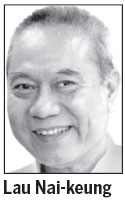Elites in CY Leung's administration
Updated: 2012-11-06 06:32
By Lau Nai-Keung(HK Edition)
|
|||||||||
I have nothing but sympathy for Honorable Franklin Lam Fan-keung, the Executive Council member who recently was trapped in yet another real estate related controversy. Right now, the focus has shifted from whether he used insider information for personal gain, to whether he bribed his real estate agent. Franklin seems to have given inconsistent accounts of the story. The press and political dissidents naturally smell blood.
In reality, it does not really matter whether Franklin acted in bad faith or not. He was doomed since he was appointed into the Executive Council. The proverbial Titanic set sail from the day he went on board.
Think about successful sit-coms. How do you create drama episodes after episodes, seasons after seasons? You put into the main cast a combination of extraordinary idiosyncrasies. So when they do the routines that normal folks like us do all the time, their characters make them react in such a way that will always produce humor.
The improbability of the actions is clear, and we will get a good laugh one way or another. Franklin had 27 pieces of property before the controversial sale. They were worth a sum ordinary folks cannot relate to. Assuming that he told the whole truth and nothing but the truth, he needed that cash from the sale to cover his expenses and for emergencies, since he is no longer working and is getting merely an honorarium of HK$50,000 for his Executive Council "service". This gives us an impression that he does not have savings proportionate to his lifestyle, and is leveraging a lot in the real estate market, to make ends meet.

Franklin also told us that he had no prior knowledge of the implementation of the new Special Stamp Duty. If he is not consulted with this specific piece of policy, has he not been asked about policies to curb housing price in general as well? If he knows that housing price is to go down, the shame is still on him. If, instead, he acted in good conscience as he is certain that he is not making a profit out of his recent transaction, i.e. that housing prices will remain strong; the problem is with CY Leung.
There remains another possibility, that his role is marginal in the Executive Council and nobody tells him anything or seeks his advice. This in fact is the most reasonable conclusion, taking into account what other members of the Executive Council have been disclosing, but more questions remain. Why was he appointed, and who wants him inside the Executive Council?
While this will be drama enough for five years to come, one subtle point must be noted. Franklin was supposedly appointed to the Executive Council because he is an "elite", but his assets (in both sense of the word) have now become his liabilities. The belief that we must rely on a benevolent speculator to rescue us from our real estate market mess, has roots in our colonial mentality, where the disadvantaged were conditioned to believe that the rich and powerful became what they were because they knew better.
While people used to adore the rich and the successful, the mood is changing. The reasons behind the change are complicated, and I do not plan to elaborate on them in this article, but I would like to point out that elites are socially constructed. Embodied in them is a societal moral standard that we use to evaluate others.
I cannot state it more succinctly than my friend Professor David Faure, in his book Colonialism and the Hong Kong Mentality, where he said "Although it goes too far to say that the Hong Kong government created an elite, so that it might make appointment from it, it would agree quite well with the literature, if I say instead that it and the sociologies of Hong Kong created the idea that there was an elite so that those who were appointed might be described, as if they could lend legitimacy to the Hong Kong government."
If they could lend legitimacy to the Hong Kong government, that is.
CY Leung sees the definition and composition of the elite (himself included) as a given. In fact it is not as if he is actively reproducing the colonial legacy.
The author is a member of the Commission on Strategic Development.
(HK Edition 11/06/2012 page3)